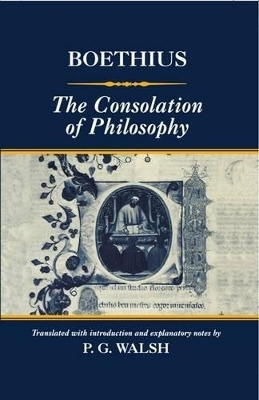
The Consolation of Philosophy
Seiten
1999
Oxford University Press (Verlag)
978-0-19-815228-6 (ISBN)
Oxford University Press (Verlag)
978-0-19-815228-6 (ISBN)
Boethius composed the "Consolatio Philosophiae" in the 6th century AD whilst awaiting death. He had been condemned on a charge of treason which he protested was unjust. Though a convinced Christian, he consoled himself not with Christian precepts but with the tenets of Greek philosophy.
Boethius composed the Consolatio Philosophiae in the sixth century AD whilst awaiting death under torture. He had been condemned on a charge of treason which he protested was manifestly unjust. Though a convinced Christian, in detailing the true end of life which is the soul's knowledge of God, he consoled himself not with Christian precepts but with the tenets of Greek philosophy. This work dominated the intellectual world of the Middle Ages; writers as diverse as Thomas Aquinas, Jean de Meun, and Dante were inspired by it. In England it was rendered into Old English by Alfred the Great, into Middle English by Geoffrey Chaucer, and later Queen Elizabeth I made her own translation. The circumstances of composition, the heroic demeanour of the author, and the `Menippean' texture (part prose, part verse; Boethius was a considerable poet) have combined to exercise a fascination over students of philosophy and of literature ever since. Professor Walsh has included an introduction and explanatory notes which combined with his new translation make the text accessible to general readers and scholars alike.
Boethius composed the Consolatio Philosophiae in the sixth century AD whilst awaiting death under torture. He had been condemned on a charge of treason which he protested was manifestly unjust. Though a convinced Christian, in detailing the true end of life which is the soul's knowledge of God, he consoled himself not with Christian precepts but with the tenets of Greek philosophy. This work dominated the intellectual world of the Middle Ages; writers as diverse as Thomas Aquinas, Jean de Meun, and Dante were inspired by it. In England it was rendered into Old English by Alfred the Great, into Middle English by Geoffrey Chaucer, and later Queen Elizabeth I made her own translation. The circumstances of composition, the heroic demeanour of the author, and the `Menippean' texture (part prose, part verse; Boethius was a considerable poet) have combined to exercise a fascination over students of philosophy and of literature ever since. Professor Walsh has included an introduction and explanatory notes which combined with his new translation make the text accessible to general readers and scholars alike.
| Erscheint lt. Verlag | 1.2.1999 |
|---|---|
| Übersetzer | P. G. Walsh |
| Verlagsort | Oxford |
| Sprache | englisch |
| Maße | 144 x 224 mm |
| Gewicht | 387 g |
| Themenwelt | Literatur ► Essays / Feuilleton |
| Geschichte ► Allgemeine Geschichte ► Vor- und Frühgeschichte | |
| Geisteswissenschaften ► Philosophie ► Philosophie Altertum / Antike | |
| Geisteswissenschaften ► Philosophie ► Philosophie des Mittelalters | |
| Geisteswissenschaften ► Sprach- / Literaturwissenschaft ► Anglistik / Amerikanistik | |
| Geisteswissenschaften ► Sprach- / Literaturwissenschaft ► Literaturwissenschaft | |
| ISBN-10 | 0-19-815228-0 / 0198152280 |
| ISBN-13 | 978-0-19-815228-6 / 9780198152286 |
| Zustand | Neuware |
| Haben Sie eine Frage zum Produkt? |
Mehr entdecken
aus dem Bereich
aus dem Bereich
auf den Spuren der frühen Zivilisationen
Buch | Hardcover (2023)
C.H.Beck (Verlag)
CHF 27,95
Konzepte – Methoden – Theorien
Buch | Softcover (2024)
UTB (Verlag)
CHF 55,85
Was Pompeji über uns erzählt
Buch | Hardcover (2023)
Propyläen (Verlag)
CHF 44,75


